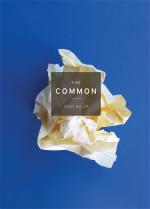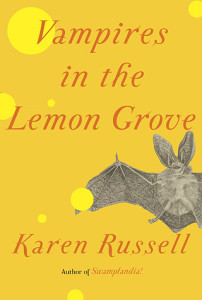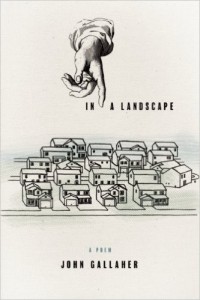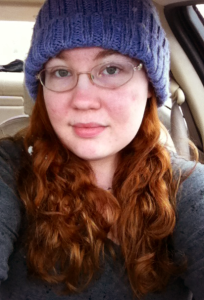Posted by Demetria Monachino, Fiction Reader and Art Curator for Issue 4.1
Before working on the Gandy Dancer, I didn’t know what a literary journal was. I didn’t know that there were publications out there dedicated to collecting individual works by writers and artists. I just sort of thought that one wrote a book–a novel, a collection of short stories or poems, a memoir–sent it to publishing houses, and got lucky. I knew that some people wrote short stories, essays, and poems, but I didn’t know where those works went, where they belonged, if not in a book.
It turns out that these pieces of literature find their homes in literary journals all over the world, one of which is The Common. Based in Amherst, Massachusetts, The Common has a rather uncommon goal: to achieve “a modern sense of place.” Unique to the world of literary journals, The Common is all about location, location, location.
 Upon first look, The Common has a striking appearance. Its readers know that when the receive their issues they can expect a minimalist, modern, and clean-looking journal that features a bold color and a “common” object on the cover, along with The Common’s signature square logo. What readers can’t predict is what exactly that eye-catching color and everyday object will be. I find that The Common’s consistent yet unpredictable approach to the appearance of their journal mimics what can be found in the pages of the journal. Yes, readers can expect to read and view pieces with a strong sense of place, but they can never know what those places will be. Just as there are endless objects in the world to choose from, there are endless places to write about. These places could be geographical, like Issue 9’s portfolio of works centered on Bombay/Mumbai, or local, like Issue 7’s “Your Parent’s House” by Zeina Hashem Beck. Or place might provide the conflict by separating two people as it does in Masha Hamilton’s “God’s Fingernail,” in Issue 9. It could even be about searching for a place to belong or something to hold on to. This is the case with Issue “In Search of Bazena Nmcova” by Kelsy Parker, which I read in Issue 7. Continue reading
Upon first look, The Common has a striking appearance. Its readers know that when the receive their issues they can expect a minimalist, modern, and clean-looking journal that features a bold color and a “common” object on the cover, along with The Common’s signature square logo. What readers can’t predict is what exactly that eye-catching color and everyday object will be. I find that The Common’s consistent yet unpredictable approach to the appearance of their journal mimics what can be found in the pages of the journal. Yes, readers can expect to read and view pieces with a strong sense of place, but they can never know what those places will be. Just as there are endless objects in the world to choose from, there are endless places to write about. These places could be geographical, like Issue 9’s portfolio of works centered on Bombay/Mumbai, or local, like Issue 7’s “Your Parent’s House” by Zeina Hashem Beck. Or place might provide the conflict by separating two people as it does in Masha Hamilton’s “God’s Fingernail,” in Issue 9. It could even be about searching for a place to belong or something to hold on to. This is the case with Issue “In Search of Bazena Nmcova” by Kelsy Parker, which I read in Issue 7. Continue reading






 At once eloquent and colloquial, Gallaher led the room through a collection of several of his “landscapes,” or numbered sections of an essay-poem comprised of seventy-one smaller poems written in about forty days. In one breath, Gallaher projected beautiful lines of poetry; in the next he shocked us with the hard drop of “fuck” or “shit,” his own speech spilling through the written lines, until his divergences began to blend with the poetry, the published lines began to mesh with the deviations from the page, and all of the words became Gallaher—a pure and whole representation of the human being who stood before us. A beautiful moment where this indistinguishable quality seemed to shine was a moment in which Gallaher reflected on a plane crash that killed three of its five passengers. Fluidly, so smoothly it was almost alarming, Gallaher brought this into the room, pointing to the row of five in the front, temporarily turning them into the passengers, the room itself into the plane, ourselves into horrified observers, and reminding us of the fragility and randomness of life, reminding us that “that’s just the way it fucking happens.”
At once eloquent and colloquial, Gallaher led the room through a collection of several of his “landscapes,” or numbered sections of an essay-poem comprised of seventy-one smaller poems written in about forty days. In one breath, Gallaher projected beautiful lines of poetry; in the next he shocked us with the hard drop of “fuck” or “shit,” his own speech spilling through the written lines, until his divergences began to blend with the poetry, the published lines began to mesh with the deviations from the page, and all of the words became Gallaher—a pure and whole representation of the human being who stood before us. A beautiful moment where this indistinguishable quality seemed to shine was a moment in which Gallaher reflected on a plane crash that killed three of its five passengers. Fluidly, so smoothly it was almost alarming, Gallaher brought this into the room, pointing to the row of five in the front, temporarily turning them into the passengers, the room itself into the plane, ourselves into horrified observers, and reminding us of the fragility and randomness of life, reminding us that “that’s just the way it fucking happens.” Sarah Hopkins, Fiction Editor, hopes for stories with sharp focus. She says, “
Sarah Hopkins, Fiction Editor, hopes for stories with sharp focus. She says, “
 4.1’s Creative Nonfiction Editor, Erin Duffy, says, “
4.1’s Creative Nonfiction Editor, Erin Duffy, says, “
